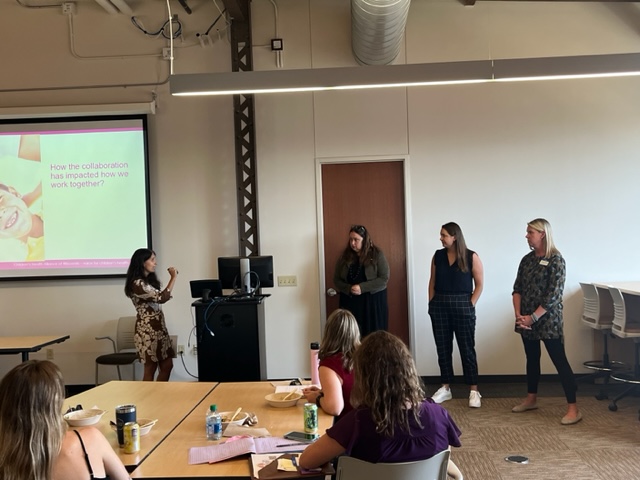Written by Geeta Wadhwani
This summer, Children’s Health Alliance of Wisconsin’s (the Alliance) food security initiative and partners had the opportunity to share the work of our collaborative with a roomful of colleagues from across the county. Data You Can Use (DYCU) hosts the Health Data Users Group (HUG) gathering where Milwaukee organizations share how data is being used to improve health in neighborhoods – connecting those with data to those who need data. DYCU has served as our evaluation partner since 2020.
My approach is simple; build relationships, build trust, and you can do some amazing work together. That takes time, a lot of listening and learning. You know that saying, “Relationships move at the speed of trust?” – I know that very well. When we started in 2021, the small group of partners did not know one another. That’s where the work of DYCU began.
Baseline evaluation
In March 2021, a baseline evaluation included both a survey and one-on-one interviews. This gave us both qualitative and quantitative data, informing us on how the partnership dynamic was starting. For example, members were asked in a survey about their perceptions – this included dedication to the work we were aspiring to do, benefit for each organization to participate, respect for the other people in the group and if what we were trying to accomplish would require a lot of different people. There was agreement and high scoring from all members of the group on these items.
There were also areas that scored low. Again, these are not unusual at baseline and provided direction for team growth. These perceptions were in areas including: people are willing to compromise, our group has adequate funds, and there is a clear process for making decisions. There were many more questions in the survey, but you get an idea of where we started.
DYCU also conducted the interviews within the evaluation process. One question focused on previous experience with the other system. This may not be surprising, but respondents in the health system and the food system had limited, to no exposure or interaction, with one another before this group. When asked about perceptions or observations of the other system, we heard that, “community based organizations don’t have a lot of staff,” “hospitals have a job for everyone,” and, “systems are like day and night.”
Data is key
This is where we were starting and it is not unusual for a new collaborative. There are differences in how each sector operates, how they are staffed and even what financial and human resources each has available. Yet each individual shared a personal commitment that could support the group’s efforts to be successful.
Today, we have a solid partnership. We have grown in both size and in relationships. We have new organizations and new faces from existing organizational partners. We’ve written grants together, supported each other’s events and fundraising efforts too.
All in all, the data is key. It has guided how we can cultivate a team and work together on shared goals. As our food security initiative evolves we will continue to prioritize evaluation to support the team’s growth.
Learn more about the Alliance’s food security initiative here.


